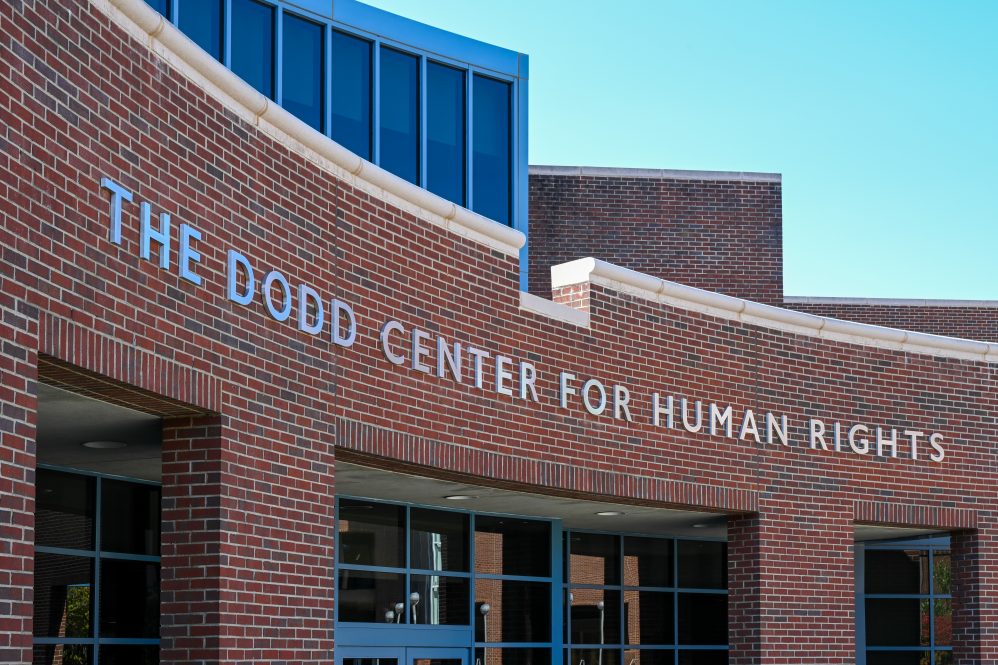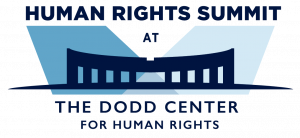Tommie Smith and John Carlos will visit UConn Storrs for the opening keynote conversation of a three-day summit examining the global and domestic issues at play in the intersection of human rights and sports

The Dodd Center for Human Rights (Peter Morenus/UConn Photo)
In the summer of 1968, on an Olympic podium in Mexico City, a pair of American track athletes each bowed their heads and raised a black-gloved fist into the air.
Tommie Smith was 24 years old with a gold medal around his neck, while then-23-year-old John Carlos wore bronze, and they kept their hands above their heads as "The Star-Spangled Banner" played in recognition of their American wins at 200-meters.
They were both shoeless and wearing black socks, representing Black poverty in America. Smith wore a black scarf around his neck for Black pride, and Carlos unzipped his track suit in solidarity for blue-collar workers and donned a beaded necklace for those, he said, who had been lynched or killed, "the people that no one said a prayer for."
Their iconic image - aired at the time on live television and published around the globe -was widely criticized. As they left the podium, they were booed by the stadium crowd. The International Olympic Committee denounced them.
In a press conference after the ceremony, Smith told reporters, "If I win I am an American, not a black American. But if I did something bad then they would say 'a Negro.' We are black and we are proud of being black. Black America will understand what we did tonight."
Their protest 57 years ago still resonates today, according to James Waller, the Christopher J. Dodd Chair in Human Rights Practice and director of Dodd Human Rights Impact Programs at UConn, because the journey toward racial equality in the United States has been a fitful one.
"The protests by Smith and Carlos," says Waller, "which transcended sports and later could be found in the echoes of the Black Lives Matter movement, remind us that the promotion and protection of human rights is a continual process that requires daily commitments by each of us."
On its best days, according to Waller - a former college athlete, and now an internationally recognized scholar on the Holocaust and genocide studies - sports are anchored in human rights values.
"Sport promotes fairness, nondiscrimination, respect, and equal opportunities for all," he says. "On its worst days, however, sport can fail to uphold these standards. Instead of promoting and protecting human rights, sport can reveal serious violations of human rights - including racial and sexual discrimination, financial exploitation, and neglect and curtailment of participatory rights and freedom of expression."
Waller has had a long personal interest in the relationship between sports and human rights. In high school, he did an independent history project on Smith and Carlos and their 1968 Olympic protest - a poster of their podium photograph hung above the desk in his bedroom.
"I remember being struck by the anger their protests evoked as well as all the ways in which their courage evoked new voices of resistance that had, for far too long, been silenced," Waller says. "The duality of reaction to their protest has always stayed with me. And, if anything, their demand for an equality of rights remains even more poignant today."

On Wednesday, Oct. 22, Smith and Carlos will visit UConn Storrs for the opening keynote conversation of a three-day summit examining the global and domestic issues at play in the intersection of human rights and sports.
Hosted by Dodd Human Rights Impact Programs, the 2025 Dodd Human Rights Summit - titled "Sport and Human Rights" - will bring together prominent professional and collegiate athletes, thought leaders, policymakers, activists, scholars, students, artists, and business leaders from around the world to examine the promise of sport as a safe, inclusive, and equitable environment regardless of color, race, religion, ethnicity, tribal affiliation, socioeconomic status, gender, or sexual orientation.
This year's summit capitalizes on the success of the first summit - held in 2023 and focused on the global assault on democracy - and, according to co-organizer and postdoctoral research associate Erica Laplante, is a natural fit for UConn, a university known for its athletic accomplishments.
By focusing the summit on the intersection of sport and human rights, we are able to leverage the strength of our human rights program with the strength of UConn's athletic reputation to bring in new speakers, attendees, and community members. — Erica Laplante, co-organizer and postdoctoral research associate
"The summit will bring a new dimension of sport to UConn, one with a human rights lens," Laplante says. "By focusing the summit on the intersection of sport and human rights, we are able to leverage the strength of our human rights program with the strength of UConn's athletic reputation to bring in new speakers, attendees, and community members."
The summit opens with the conversation between Smith and Carlos, moderated by the sports journalist, columnist, and former ESPN contributor Bill Rhoden.
Over the following two days, attendees can expect a diverse range of topics and voices exploring the relationship between sports and human rights.
On Thursday, Oct. 23, the summit will feature discussions on gender and resistance, with a keynote from Pablo Torre, host of "Pablo Torre Finds Out" and a former ESPN writer and on-air personality. The day will close with a panel on sportwashing, focusing on how states, corporations, and governing bodies use major sporting events to project power, shape narratives, and obscure human rights issues.
The final day of the summit, Friday, Oct. 24, opens with a keynote from Paralympic gold and three-time silver medalist, ESPN personality, and author Victoria Arlen on the power of gratitude. A later panel will discuss the intersections of sports and corporate power.
The summit will close with a discussion of sport and human rights close to home featuring UConn athletes and coaches, including former men's basketball star Doron Sheffer '96 (BGS); UConn's interim director of student activities and former track and field standout Trisha Hawthorne-Noble '11 (CLAS) '18 MSW; Bethany Hart Gerry '00 (CAHNR), Olympian and UConn All-American; and Harrison Brooks Fitch Jr. '64 (CLAS), son of the late Harrison Fitch, UConn's first Black basketball player.
 Throughout the summit, attendees will also be invited to visit a new exhibit at The Dodd Center focusing on archival research and informational interviews to spotlight key moments related to sports and human rights in the University's history - mirroring many themes from the summit's sessions.
Throughout the summit, attendees will also be invited to visit a new exhibit at The Dodd Center focusing on archival research and informational interviews to spotlight key moments related to sports and human rights in the University's history - mirroring many themes from the summit's sessions.
"For example, one station traces the history of women in sport at UConn pre- and post-Title IX, and another centers on 'Race, Sport, & Human Rights at UConn,' which in part features the story of Harrison 'Honey' Fitch," says Laplante. "Another focuses on business, sport, and human rights, highlighting the student activism and campus initiatives that contributed to the University's commitment to ethical sourcing of collegiate apparel in the early 2000s.
"By showcasing select emblematic events, the exhibit represents an 'opening conversation,' and our hope is that it will inspire additional research and reflection about the University's sport and human rights legacies" Laplante says.
The entire event - which is free and open to members of the UConn community as well as the general public - is designed to foster dialogue and encourage networking around these complex human rights issues.
"The relationship between sport and human rights is timely and perfectly suited for a university with such a proud tradition of athletic success," says Waller. "I think we have a summit program that will bring an entirely new set of eyes and ears to The Dodd Center for Human Rights. There will be students, faculty, staff, and community members who are attracted to this topic in ways that they might not be attracted to much of the other programming we do."






